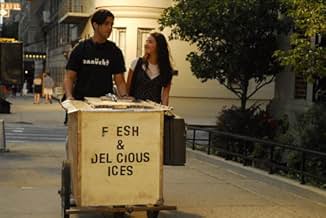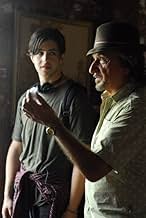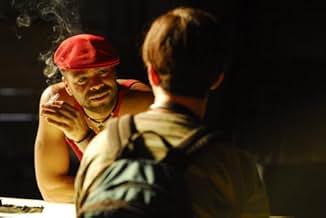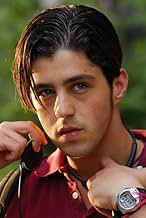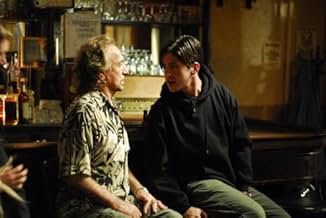The success of 'The Wackness' is fragile. If you can hear that phrase right--the wackness, the movie will probably work for you. That's enough: the wackness. It almost feels like writing about it will crush it. Things don't seem to fly at first. Here we are. Okay, there's this high-school graduate called Luke Shapiro (Josh Peck). He lives on the Upper East Side of NYC but his father's had an economic disaster and they're threatened with banishment to New Jersey. The older generation's approaching meltdown and the youngsters are about to move on. Much about 'The Wackness' sounds routine. The coming-of-age story, the nerdy kid who wins over the cute girl, the constantly feuding parents, the offbeat shrink sessions, the nostalgia for a period recently gone. Why does it work? The simple answer: Josh Peck, who plays the young man, Luke Shapiro. Peck, who's tall and a bit chubby (he was a flat-out fat boy in Mean Creek and the TV kid comedy series "Drake & Josh"), wonderfully steers along on the edge between nerdy and cool and the result is irresistibly charming. However self-conscious Luke's lines may be at times, Peck's timing and delivery turn them into gold. Luke's relationship with the messed-up shrink Dr. Squires (Ben Kingsley), who trades him therapy for good bud, is endearing too, but Squires is close enough to being a real mess so it's not too cute. It's the summer of 1994 in hiphop graffiti New York just at the moment when Mayor Giuliani came to wipe out "quality of life crimes" and drain the sleaze and the color out of Times Square. Probably the writer-director (Jonathan Levine) was this age then. Words like "dope" and "wack" and "yo" and "what up" fly through the air with abandon. The movie pushes the same slang words too hard, and mentions Giuliani more than it needs to. And what's with "mad"? Did they really say that? "You're mad out of my league." "I got mad love for you shorty. I want to listen to Boyz2men when I'm with you," says Luke to Stephanie (Olivia Thrilby). (They trade mix tapes.) It's a heat wave, so he says "It's mad hot." The dialog is mad free with "mad." Accurate or not, the New York-Nineties references are a bit more constant and self-conscious than they need to be. At first some of the more prominently noticeable visual business also seems over-the-top: a teenager selling masses of weed out of a decrepit ice cream cart and trading it for therapy; the shrink's giant glass bong which he lights up in his office during a session. But, whatever, as the blasé Stephanie would say. It still works, because the main characters are endearing and their dilemmas are true to life. The thing is, Luke needs to get laid. Squires offers a hooker, not pills, for this issue. The doctor himself takes a kaleidoscope of antidepressants to cope with being a mess and having a sexy young wife (Famke Janssen) on the verge of leaving him. The solution of Luke's problem turns out to be convoluted because Stephanie, who accepts to hang out with him and then teaches him to make love, is Squires' own step-daughter. That's tricky for Squires. He has problems of his own. He has one big one: he's afraid life is passing him by. No obvious role model though a pal to Luke, he's such a mess he lusts after teenage girls himself, and smooches with Mary-Kate Olsen in a phone booth. This, by the way, was the day when drug dealers still used pagers and pay phones. And even if the Giuliani theme is pushed as are the "what up's," nonetheless Squires' dishevelment and Luke's selling drugs out of a cart are logical figments of the fading pre-Giuliani New York, and that fading sleaze is like the fading of Luke's virginity as his "nasty thoughts," which he says he enjoys, yield to real experiences of sex and to the pain of falling in love when it's not returned. By now it may be redundant to say it, but Josh Peck makes Luke's mixture of vulnerability and bravado, very real. The plot turns out to be not so much clichéd as simple and true. When Luke's heart gets broken, it really hurts to watch it. Though the drug distributors Luke gets his marijuana from--and he sells many large bricks of it that summer in hopes of saving his parents' apartment--are conventionally high-powered guys with machine-guns and Jamaican accents, ninety percent of the time Levine keeps his story low-keyed and doesn't strain for effects. And he doesn't need those, because Josh Peck's and Ben Kingsley's line readings sing out enough to make any movie memorable. As one blogger puts it, Luke's "kind of dopey pseudo-gangsta, but nerdishly sweet smile managed to convey both the character's pretense and genuine good nature." All the English Peck puts on his lines reflects his character's efforts to strike a pose, but the "nerdishly sweet smile" instantly undercuts the poses and makes them endearing. He's functional enough. Stephanie has taken some small interest in him, enough to want to hang out despite her having been "mad out of my league" in high school. And he must have got dealing dope down if he can make $26,000 in some heavy weeks of the summer. But he's in need of an attitude adjustment. This is how Stephanie puts it: "I see the dopeness; you only see the wackness." He's been faking it and now he needs to make it. He needs to love life. And suffer pain. And she gives him both opportunities. This is pretty well how the world is for a young dude. When it hurts to watch Luke suffer, it hurts in a good way. P.s. Jane Adams is mad fly as Elanor, an ex-musician pothead. Her ingenious excuses for constantly scoring weed are as good as anything in David Foster Wallace's Infinite Jest.








